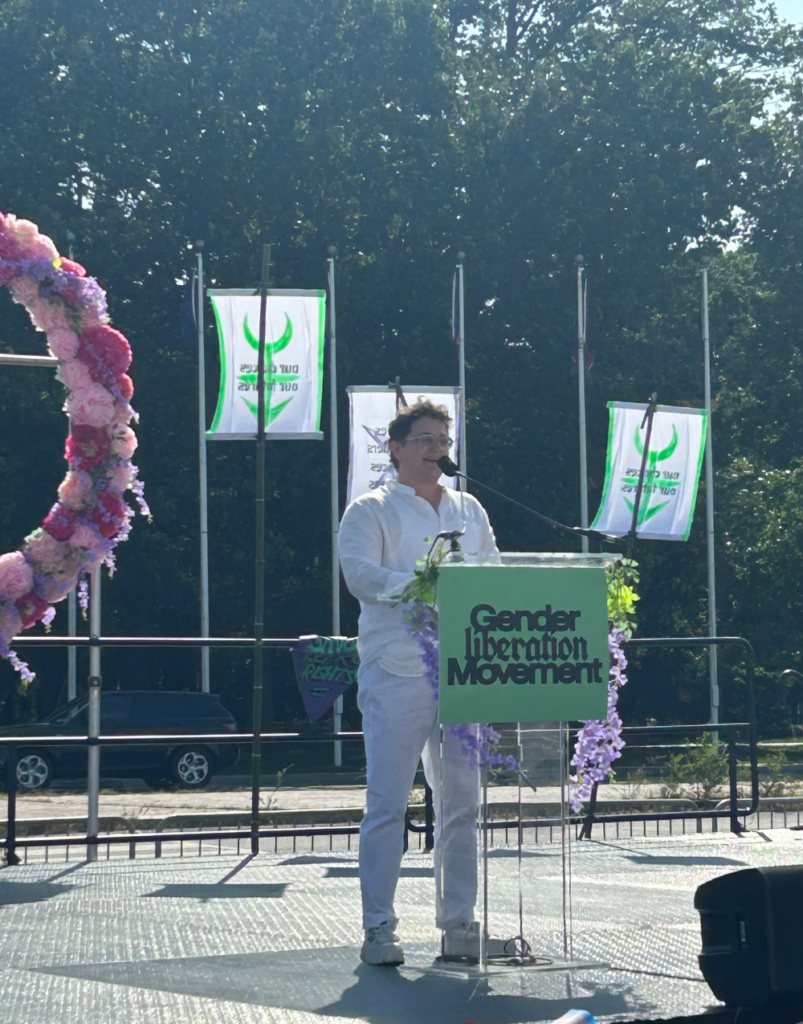October Letter from the Board
This September, I had the honor of speaking at the first Gender Liberation March in Washington, D.C. The march was a project of the Gender Liberation Movement, a coalition that includes organizers of the Brooklyn Liberation Marches and Women’s Marches and fights for bodily autonomy and self-determination by building bridges and power with LGBTQ and feminist communities.
The Gender Liberation March brought thousands of people to D.C. as a response to the hundreds of bills that have been introduced in the last several years attacking LGBTQ rights and access to reproductive and gender affirming health care. If you’re a member of the NTBA, you probably already know the horrifying statistics, so I won’t go in depth about the hundreds of anti-trans bills that were introduced this year, the14 states that currently have a total abortion ban in place, and the 26 that ban gender-affirming health care for young people.
Despite the dire threats motivating the march, that day ended up being one of joyous celebration and resistance. One moment that crystalized the irreverent, creative passion of the event occurred during the march itself. After marching to the Supreme Court, we proceeded to the headquarters of the Heritage Foundation, the far-right organization that published the infamous Project 2025. When we arrived, we found a DJ playing music, and the crowd quickly fell into an impromptu dance party, forming a circle where marchers took turns showcasing their moves, vogueing and celebrating the beauty of queer and trans resistance on the Heritage Foundation’s doorstop.
Back at our gathering point, speakers like Stonewall veteran and community leader and elder Miss Major, drag icon Peppermint, trans youth activist and Trans Prom organizer Daniel Trujillo, actor Elliot Page, and author and organizer Raquel Willis spoke about their own fights for self-determination, as well as the interconnectedness of struggles against gendered oppression and racism, xenophobia, ableism, and more.
I was brought in for the boring legal context, addressing the upcoming Supreme Court case on transgender rights and the state of the law regarding access to gender affirming and reproductive health care. But I tried to mirror some of the joy and resistance I witnessed that day. The last part of my speech, after I had addressed Skrmetti and the ways in which attacks on access to gender affirming and reproductive care are intertwined, is included below. I chose to end it on a hopeful note about what keeps me in this fight. I hope that you all, as members of the NTBA, can find your own reasons to continue fighting too.

“But there is good news. When we stand together against these attacks, when we stand together for bodily autonomy, for liberation for people of all genders, we win. Referendums protecting abortion access overwhelmingly pass. And district courts, courts that have to actually listen to the experts in person and look trans people in the eyes as we say what this care means to us, these courts overwhelmingly protect our access to care. The right is attacking doctors and teachers, parents and librarians, and trying to drive our movements apart because they know that together we are stronger.
With this Supreme Court case looming, I often find myself thinking of the first openly trans plaintiff to go before the United States Supreme Court to protect her rights, Dee Farmer. Dee Farmer was an incarcerated Black trans woman who filed a lawsuit on her own, without a lawyer, to challenge her treatment in prison. Dee fought all the way up to the Supreme Court, gaining allies on the way. And she won. And Dee continues to help other incarcerated trans people file complaints and fight for justice as a movement leader today.
Dee is part of our history for justice, and that history, a history of brilliance and resilience, of fighting no matter what and beating the odds, of community-built power, that is what gives me strength every day to fight for our rights. I hope that you will continue to fight with me. Thank you.”

